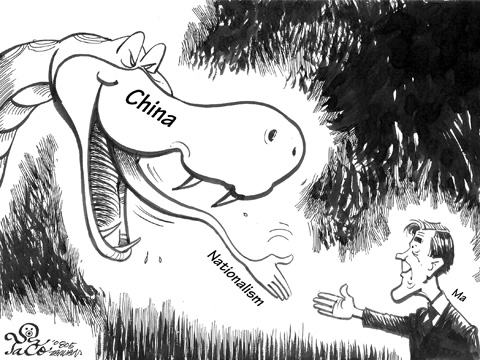¡@

¡@
¡@
Beijing's
new (old) best friend
Tuesday, May 27, 2008, Page 8
As the Cold War taught us, fear and the inability to fully predict the
opponent¡¦s true intentions can lead to acts that, in the worst of times, have
taken humanity to the brink of catastrophe. The Berlin Blockade, the Cuban
Missile Crisis and the nuclear arms race between East and West are but three
examples of misinterpreted signals or flawed communication that could have ended
in disaster. What these three and other instances of brinkmanship have in common
is that fear ¡X fear of the unknown ¡X guided policymakers and made them adopt
strategies that, with hindsight, look like sheer folly.
Similar fears appear to be animating two countries today: China and Russia. No
historical friends (despite a fleetingly shared ideology) and long haunted by
border disputes, Moscow and Beijing are being pushed into the same corner by
policies of the US and its regional allies. Whether their reading of
Washington¡¦s true intentions is accurate or not remains to be seen, but one
thing is sure ¡X the two are weary and they are acting on it, epitomized in no
uncertain terms by Russian President Dmitry Medvedev¡¦s visit to Beijing over the
weekend.
Two main items have appeared on radar screens in Moscow and Beijing that have
made them consider an alliance of convenience.
The first is the US-led expansion of NATO ¡X launched soon after the fall of the
Berlin Wall ¡X that has crept ever closer to Russia¡¦s strategic border and
effectively encircled it, which, in Moscow¡¦s view, threatens not only its
sovereignty, but also its access to natural resources and political influence in
Central Asia.
The second item, raised in two different theaters ¡X Europe and Asia ¡X is the US
ballistic missile defense system, which in both instances threatens to obviate
Moscow and Beijing¡¦s nuclear deterrent. Both have long been opposed to the
deployment of such systems, with Beijing seeing it as an attempt to permanently
make Taiwan out of its reach.
While it will be years, if not decades, before an effective US defense system
can be deployed, China and Russia have already begun to adjust their policies
and respective militaries to counter what they perceive as an attempt by the US
to buttress its hegemonic power and thus allow it to dictate its policies in a
part of the world that, in their eyes, is more theirs than Washington¡¦s.
Rather than sit down with its counterparts in Beijing and Moscow and find common
ground on missile defense, Washington has acted in a manner that has alienated
its counterparts and managed to make two unlikely allies shed their differences
and join forces to counterbalance the US. Furthermore, the failure to engage in
dialogue and the apprehensions that this gives rise to also threatens to compel
Beijing and Moscow to expand their newfound friendship to include other
countries ¡X Iran comes to mind ¡X that, for one reason or another, are inimical
to the US and the alliances it leads.
There are, at present, no signs that dialogue between the two blocs will improve
anytime soon. Secrecy, as the Cold War made crystal clear, begets secrecy.
Beijing¡¦s lack of transparency on military matters ¡X which has earned it no
small amount of criticism by Washington ¡X has contributed to the very mistrust
in Japan, Taiwan and the US, among others, that makes the deployment of a
missile defense shield desirable. But this plan also gives rise to a vicious
circle in Russia and China, where the unclear intentions of the US have prompted
them to bolster their defenses in a bid to countervail what they perceive as a
threat to their sovereignties.
Unless the principal parties sit down and talk soon, a new Cold War could soon
begin in the east, with implications for all, not least Taiwan.
¡@